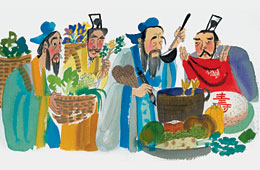
When visiting the great Sage's hometown of Qufu, in the eastern Chinese province of Shandong, it's unlikely you'll be served a fortune cookie that reads: "Confucius says ..." But it can be safely predicted that you will enjoy the elaborate tradition of Confucian cuisine. Dating back some 212 millenniums, this sub-branch of the Chinese culinary arts was devised to meet Confucius' exacting standards: "For your dinner," he once wrote, "you can never cook your food too finely nor mince your meat too well." These ancient recipes were passed down by his descendants until the communist takeover, when the gastronomic arts suffered badly. During the 1966-76 Cultural Revolution, Qufu chefs were punished for their élitist orientation and forced to churn out homogenous brown slop for the masses. Today, though, with China's leaders rehabilitating the reputation of the country's most famous philosopher, tourists are again flocking to Qufu to sample his namesake cuisine.
Unlike the chili-spiked pungency of Sichuanese or Hunanese food, Confucian cuisine is subtle, stressing clean flavors and unusual textures. Chefs—some of whom share Confucius' surname, Kong—undergo years of training, learning how to, say, turn strips of ham into complicated Chinese characters that adorn delicate, savory custards. Expensive ingredients like bird's nest, abalone and sea cucumber are used with abandon, although simpler dishes like braised eel or steamed shrimp are also served. Many of the best restaurants are located near the Confucius Mansions, the vast residential complex where the Sage's descendants once lived in opulent surroundings rivaled only by the Forbidden City in Beijing. Banquets at the Confucius Mansions often ran to 180 courses, an admirable exercise in gustatory pacing. Qufu restaurants today aren't quite as ambitious. But when dining, make sure staff explain the ancient mythologies that inspired fanciful dish names like "Eight Immortals Crossing the Sea While Teasing Buddhist Saints." Don't be tempted, however, to ask the chef to share recipes so you can recreate the dishes at home. As Confucius once said: "The honorable and upright man keeps well away from the kitchen."
—By Hannah Beech